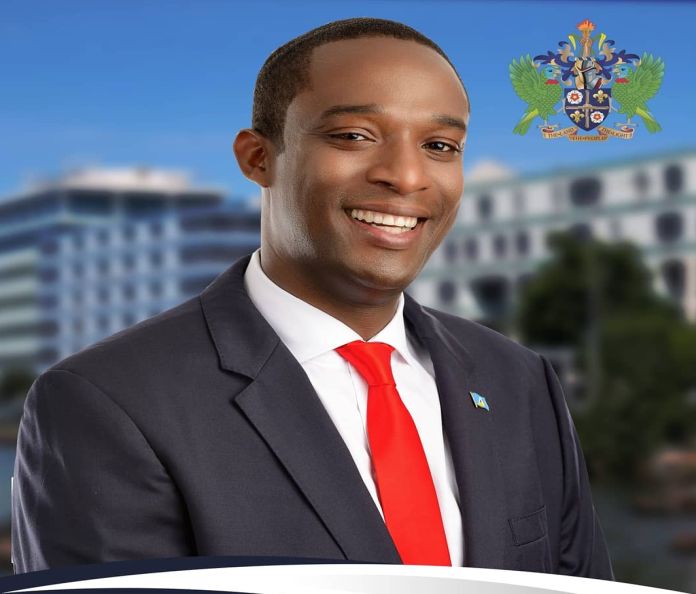By Caribbean News Global ![]()
TORONTO, Canada – Minister in the Ministry of Finance, Wayne Girard, disclosed recently that “This year there will be no new taxes,” pertaining to the 2024/2025 estimates of expenditure and revenue. The government would further emphasise youth, sports, education, and health. The minister said: “We are just above 75 percent (GDP) at the moment, and we are trending downwards,” he continued. As a result, the minister of finance Philip J. Pierre’s administration spent the last few years lowering the figure, to decrease the debt-to-GDP ratio to 60 percent by 2035 (the prudential level).
One may introduce the thought and inquire if this is the right message and strategy: it was a botched delivery and the impact ruined? And, to get a sense of the many moving parts ahead of budget 2024; could it just be an effective shield to healthcare, security and infrastructure un-deliverables?
Taxes are important. The economy of Saint Lucia undoubtedly needs a strong base, trade and foreign policy, health care, security, investment capital, infrastructural development and climate adaptation.
Related: Guyana to assist St Lucia’s housing deficit, regional connectivity, food distribution hub
‘Read my lips: No new taxes’
‘No New Taxes’ – these three memorable phrases – previously fastened with ambiguity, a promise, and undependable, draw reference to “Read my lips: No new taxes.” The crafty one-liner helped president George H.W. Bush during his 1988 run for the presidency.
The memorable catchphrase – a tax pledge – also taught president George H.W. Bush a political and economic lesson. The deficits held the US economy ransom and became an encumbrance globally. He was widely mocked since the promise could not hold and later became a one-term president.
For decades, governments have withheld critical information from the people of Saint Lucia. In fact, transparency and accountability are the best-held state secrets and represent a larger problem of the accepted norm of what passes for good governance.
Raising taxes, and politicizing crime and public health can make and destroy political careers, notwithstanding a case can be made in every discipline.
In prior estimates and expenditures, the government raised various fees and levies. In other instances, increased personal tax allowance, and offered concessions as perceived; for social and economic relief.
However, a substantive conversation and practical guidance towards tax policy is yet to surface on the integration of tax revenue with the optimal level of government expenditure.
The lesson here again gravitates to president George H.W. Bush not having a genuine consultation and conversation with the country, and to a least [after the election] – simmer down the debacle of the promise – and offer some wiggle room – that he would only raise taxes as a last resort. But he didn’t, thinking otherwise.
Outside of such a global playbook, ‘Saint Lucians can provide workable ideas and practical solutions to drive today and tomorrow’s economy, but when political ideology and a politically driven economy interlock in five-year cycles, the machinery of good governance eventually stops working.’
Revenue enhancement
Ideological and strategic figures still want an alternative, as evidenced by drawing to the economic agenda for 2024 and looking like a lottery ticket for indicators and doubtfulness about real political liability and economic diversion.
Escalated insecurity and violence continue to drive insecurity in Saint Lucia. Violence, inflation residual price shocks, climate adaptation and food insecurity exacerbated social, political and economic outcomes.
Revenue enhancement is an important stride in raising revenue to cite, finance minister Philip Pierre’s – Prior Policy Action: Prior Policy Action:
“To enhance tax revenue and support fiscal sustainability, the government has (i) introduced the Health and Security Levy at a rate of 2.5 percent on goods and services except food items, medicines, selected building materials, medical equipment, and security equipment, and (ii) increased the Excise Tax on Tobacco Products.”
To further support “ what we found” in the 2022/23 budget speech reads:
“The sad reality of our situation is that the government has been financing much of its debt commitment by rolling over its bonds and treasury bills and short-term financing. For the last eight months, and until this budget cycle begins, we have had no access to institutional lending as this avenue was exhausted by the last administration.”
Prime minister and minister for finance, Pierre, has also cited key indicators by the International Monetary Fund (IMF) forecast in its January 2024 World Economic Outlook Update that global GDP is likely to grow 3.1 percent in 2024, unchanged from 2023. Here in the ECCU, the growth outlook is positive, the economy continues to expand and inflation is abating. Implementing strategic reforms is key for building resilience and elevating the growth trajectory.
Independent thoughts
Dr Alphonsus St Rose, in his Independent thoughts, wrote:
“[..] Consider the detestable fact in how our much-touted economic growth has left most citizens disadvantaged. Such economic growth must afford them a pathway out of poverty, inequality, social deprivation and the illicit economy that drives crime and violence. It must not represent rewards for a minority economic elite at the expense of the poor and working-class majority. That is antithetical to democracy.”
In the article, ‘How the G20 can build on the world economy’s recent resilience,’ Kristalina Georgieva, writes:
“It’s also vital for countries to continue making important strides in raising revenue and weeding out inefficiencies. Brazil has shown leadership in this area with its historic VAT reform. But many countries are lagging, with scope to broaden their tax base, close loopholes, and improve tax administration. This is why the G20 has asked us to launch a joint initiative with the World Bank to help countries boost domestic resource mobilization. In addition, countries should aim to build more inclusive and transparent tax systems, ensuring the international tax architecture takes into account the interests of developing countries.”
Therefore, it is understandable that the deficit problem, inflation and enhanced revenue need an orderly reform package of tax revenue, free and fair trade, growth incentives, public debt management, and public financial management regulations.
In addition, Dr St Rose maintains:
“We need a medium to long-term strategic and actionable development plan to energize the economy in all its productive and non-productive sectors while embracing the net zero just energy transition drive to replace fossil fuel. Our citizens need to acquire the necessary strategic skills for economic growth and progress beyond tourism. That must include the digital, technological and brain-driven industries of today, tomorrow and into the future.
“This can only be acquired through dedicated investments in vocational, technical and academic-based quality education and skills training of our citizens and, more specifically, our labour force.
“We will not be able to deliver a sustainable economy of fair opportunities and dignified possibilities for every citizen if we are unable to inspire and motivate them into a mindset and reality of sacrifice, hard work and education.”
The point is pretty simple
In the battle for hearts and minds and to maintain a commitment to prosperity is worth supporting practicality vs the three memorable phrases – “No New Taxes’” – made for “good politics.”
The protracted view beyond 17.5 percent VAT for Saint Lucia is not far-fetched without policy, legislative, and institutional reforms.
The government may need a home run or a hit beyond the boundary in cricket terms. However, floating on a life-raft in the Caribbean Sea isn’t a realistic protection for safety from the elements. It’s hard to catch a breath while catastrophe lurks around the corner.
It is fair to have revenue and expenditure, fiscal consultation, tax reform and enhanced revenues on the table, to tackle a vision and long-term development of Saint Lucia, beyond the five-year cycle of political image building and electioneering.
So encapsulating: “This year there will be no new taxes” – the point is pretty simple; Did the government raise/enhance taxes as a first resort?




